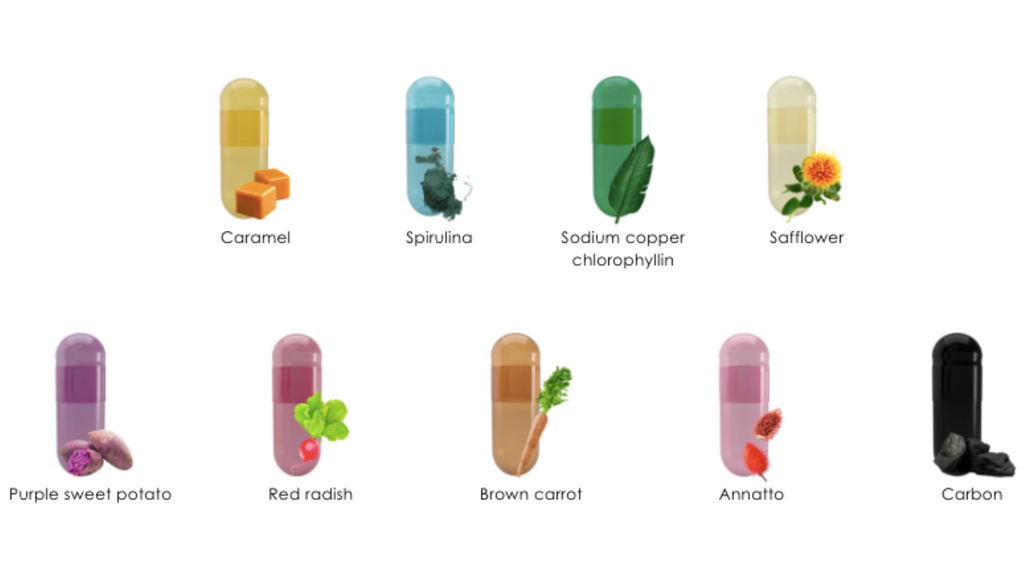Capsules with Natural Colorants: All you need to know
Introduction
In recent times, as more consumers take charge of their health and decide what they want in products, pharmaceuticals, and nutraceuticals face a growing list of requirements in favor of satisfying consumers' preferences. From Halal, Kosher-certified, Vegan-verified, allergen-free, Non-GMO, and more recently to all-natural specifications, the industry now requires the use of natural colorants in empty capsules.

Some manufacturers would respond to this demand by switching altogether to clear vegetarian capsules. However, this may be at the expense of losing their brand differentiation. A new generation of capsules made with natural colorants has evolved to help manufacturers meet their clean label status without losing their product uniqueness.
Read on to learn more about natural colorant capsules, why they are used, and how these special capsules may benefit you more as a health-conscious consumer or dietary supplement manufacturer.
What are natural colorants?
Natural colorants are pigments extracted from natural sources and not synthesized chemically. Common sources of these pigments include algae and plant parts like flowers and leaves.
Examples of the natural colorants used in capsule production include:
- Chlorophyll (green-colored) and its water-soluble derivative (chlorophyllin); derived from green plants and algae.
- Spirulina (blue); is derived from blue-green algae.
- Safflower (yellow); is derived from the flowers of Carthamus tinctorious, which is rich in carthamin.
- Saffron (orange or golden yellow); derived from Crocus sativus.
- Annatto (orange or golden yellow); obtained from the Achiote tree (Bixa Orellana).
- Vegetable carbon (black); derived from cellulose residue of charred vegetable material.
- Caramel (reddish brown); derived from heated corn syrup.
With these pigments, capsules can be produced in a variety of colors which allow nutraceutical manufacturers to create or maintain their unique product identity while staying off synthetic dyes.

Why use natural-colorant capsules
As a manufacturer, using colored capsules in your products generally can increase the product's attractiveness and acceptance to consumers. Better still, when you opt for capsules that are colored with natural pigments over those with synthetic colorants, you get to maximize the benefits of colors for your brand and offer more health benefits to the end users.
These benefits include:
Supporting your natural claims
Consequent to the sustainable and 'clean label' movement, using vegetarian capsules alone is becoming insufficient to lay claims to your product being so 'natural'. Using veggie caps with natural colorants can help you send a stronger message.
The natural pigments are nontoxic and eco-friendly and they are most suited for vegetarian capsules. For instance, by using HPMC capsules fortified with chlorophyll, you get to keep synthetic colorants and opacifiers out of your ingredient list.
Nutritional value
Many natural colorants used in capsules are a good source of essential micronutrients. Their nutritional value is maintained in capsules because their gentle extraction process does not degrade the nutrients contained in the source plant nor produce toxic byproducts.
Health benefits
Some natural pigments may offer additional health benefits because of their high antioxidant and anti-inflammatory activities. For example, studies have shown the positive effects of chlorophyll on skin health, saffron on the heart, and beta carotene (found in safflower) in the eye. Using capsules produced with these beneficial pigments offers consumers an indirect way to supplement them.

Best way to use natural-colorant capsules
Being a derivative of HPMC capsules, natural colorant caps are suitable for all kinds of fill materials, be it powders, solutions, gels, pastes, oils, pellets, or granules.
Also, the presence of natural colorants does not alter the stability, shelf-life, oxygen resistance, dissolution profile, or fill performance of the capsules in use.
However, as a dietary supplement manufacturer, there are important considerations you should make before switching to natural colorant capsules.
Firstly, note that natural-color caps may fade when exposed to UV or IR light for a long time; hence it is advisable to provide light-resistant packaging for the capsules.
Also, there is a high chance of variability in the hues of the capsules between batches. That is due to the natural variation in the concentration of pigments among the source plants, hence the transferred variation in the color of the capsules produced with different batches of processed pigment. However, this issue will not significantly impact your product identity.
Furthermore, it is crucial to ascertain the regulatory standpoint on your choice of natural colorant in your country or region of business activities. There are sometimes marked differences in what classifies as a natural colorant by each national regulatory authority. However, you can scale this hurdle by working with a reputable capsule manufacturer to align with the necessary regulations.
How to get the best natural-colorant caps
Working with natural pigments involves more technicalities than synthetic dyes. So, not all capsule producers are equally equipped to give you your desired color caps at the best quality. Here is how you can get the best natural color caps on the market.
Reputable capsule manufacturers obtain top-grade natural dyes from carefully selected plant sources through standard refining processes. The capsules are then produced to quality to meet both local and international specifications.
You can get this and more at Capsuline
Our range of Capsuline titanium dioxide-free colored empty vegetarian capsules are produced in our GMP-approved facility and have passed standardized quality tests. The wide foray of color choices available includes chlorophyll (green), spirulina (blue), safflower (bright yellow), caramel (golden yellow), and annatto (reddish).
Our capsules give you top-rate aesthetic appeal, masking property, branding flexibility, and more importantly, that 'natural' feel that neatly conveys your clean label identity. These capsules are available in stock in sizes 0 and 00 which are the commonly-used capsule sizes in pharmaceutical formulations. But we can also manufacture any other size by request. Also, Capsuline natural color capsules are all Vegan-verified, Kosher and Halal-certified, and free of allergens.




